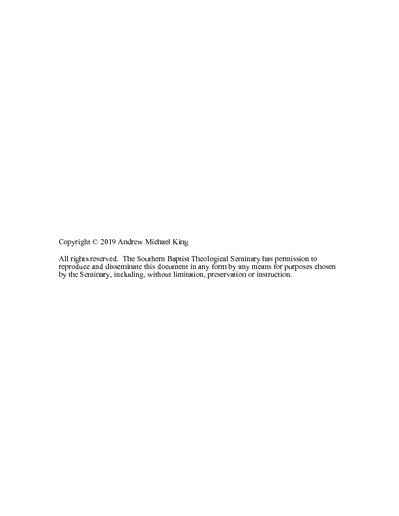| dc.contributor.advisor | Garrett, Duane A. | |
| dc.contributor.author | King, Andrew Michael | |
| dc.date.accessioned | 2019-06-05T18:00:32Z | |
| dc.date.available | 2019-06-05T18:00:32Z | |
| dc.date.issued | 2019-03-19 | |
| dc.identifier.uri | http://hdl.handle.net/10392/5822 | |
| dc.description.abstract | This dissertation assesses how the book of Amos shapes the social identity of its audience. Chapter 1 contextualizes this project in Amos scholarship and shows the relevance of this study.
Chapter 2 introduces the Social Identity Approach employed in the dissertation. Various applications of the Social Identity Theory and Self Categorization Theory in biblical studies are surveyed.
Chapter 3 examines conflict and social identity in Amos. Through a study of the Oracles against the Nations and the confrontation with Amaziah the priest, various social group dynamics are brought to light. Unresisting audiences entering the world of the text who desire a positive sense of social identity will naturally align themselves with the ingroup. In this case, both YHWH and Amos are shown to be prototypical group members.
Chapter 4 explores Amos’s use of the past for the purpose of identity-formation. Social memory is introduced as an additional heuristic tool to interpret history as an othering strategy in the book. The prototypicality of YHWH contrasts sharply with the values of the addressees.
Chapter 5 looks at Amos’s conception of the future for identity formation. Through analysis of the Day of YHWH, the remnant motif, and the epilogue of the book, this chapter shows how Amos amplifies judgment against the outgroup but also provides a hopeful future for the ingroup. For audiences desiring a positive social identity within the world of the text, the utopian future of Israel motivates non-group members to join the ingroup. A more detailed look at the theoretical process of motivation and identity formation is provided.
Chapter 6 summarizes the argument and conclusions of the dissertation, reiterating the relevance of this approach for contemporary audiences of Amos. | en_US |
| dc.subject.lcsh | Bible. Amos--Criticism, interpretation, etc. | en_US |
| dc.subject.lcsh | Bible. Amos--Social scientific criticism | en_US |
| dc.subject.lcsh | Group identity | en_US |
| dc.subject.lcsh | Identification (Religion) | en_US |
| dc.title | “You Only Have I Known”: Social Identity and the Book of Amos | en_US |
| dc.type | Electronic dissertation | en_US |
| dc.type | Text | en_US |
| dc.contributor.committee | Williams, Jarvis J. | |
| dc.contributor.committee | Parker, Shane W. | |
| dc.type.qualificationname | Ph.D. | en_US |
| dc.publisher.institution | Southern Baptist Theological Seminary | en_US |
| dc.publisher.department | School of Theology | |

